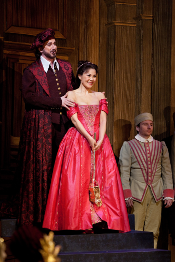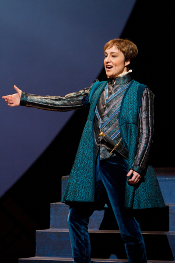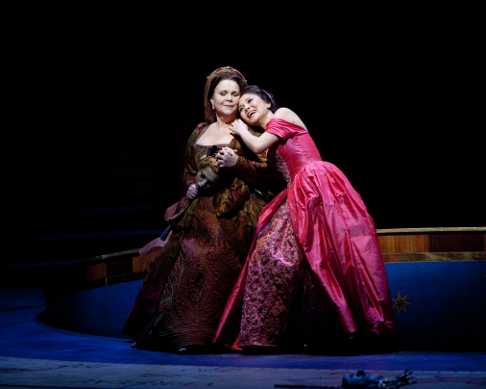![Piotr Beczala as Roméo and Hei-Kyung Hong as Juliette [Photo by Marty Sohl courtesy of Metropolitan Opera]](http://www.operatoday.com/RJ_Met_2011_01.png)
18 Mar 2011
Roméo et Juliette, New York
Is Guy Joosten’s staging of Roméo et Juliette the best-looking production in the Met’s current repertory or what?
English Touring Opera are delighted to announce a season of lyric monodramas to tour nationally from October to December. The season features music for solo singer and piano by Argento, Britten, Tippett and Shostakovich with a bold and inventive approach to making opera during social distancing.
This tenth of ten Live from London concerts was in fact a recorded live performance from California. It was no less enjoyable for that, and it was also uplifting to learn that this wasn’t in fact the ‘last’ LfL event that we will be able to enjoy, courtesy of VOCES8 and their fellow vocal ensembles (more below …).
Ever since Wigmore Hall announced their superb series of autumn concerts, all streamed live and available free of charge, I’d been looking forward to this song recital by Ian Bostridge and Imogen Cooper.
Although Stile Antico’s programme article for their Live from London recital introduced their selection from the many treasures of the English Renaissance in the context of the theological debates and upheavals of the Tudor and Elizabethan years, their performance was more evocative of private chamber music than of public liturgy.
Evidently, face masks don’t stifle appreciative “Bravo!”s. And, reducing audience numbers doesn’t lower the volume of such acclamations. For, the audience at Wigmore Hall gave soprano Elizabeth Llewellyn and pianist Simon Lepper a greatly deserved warm reception and hearty response following this lunchtime recital of late-Romantic song.
For this week’s Live from London vocal recital we moved from the home of VOCES8, St Anne and St Agnes in the City of London, to Kings Place, where The Sixteen - who have been associate artists at the venue for some time - presented a programme of music and words bound together by the theme of ‘reflection’.
'Such is your divine Disposation that both you excellently understand, and royally entertaine the Exercise of Musicke.’
‘And there was war in heaven: Michael and his angels fought against the dragon; and the dragon fought and his angels, And prevailed not; neither was their place found any more in heaven … that old serpent … Satan, which deceiveth the whole world: he was cast out into the earth, and his angels were cast out with him.’
There was never any doubt that the fifth of the twelve Met Stars Live in Concert broadcasts was going to be a palpably intense and vivid event, as well as a musically stunning and theatrically enervating experience.
‘Love’ was the theme for this Live from London performance by Apollo5. Given the complexity and diversity of that human emotion, and Apollo5’s reputation for versatility and diverse repertoire, ranging from Renaissance choral music to jazz, from contemporary classical works to popular song, it was no surprise that their programme spanned 500 years and several musical styles.
The Academy of St Martin in the Fields have titled their autumn series of eight concerts - which are taking place at 5pm and 7.30pm on two Saturdays each month at their home venue in Trafalgar Square, and being filmed for streaming the following Thursday - ‘re:connect’.
The London Symphony Orchestra opened their Autumn 2020 season with a homage to Oliver Knussen, who died at the age of 66 in July 2018. The programme traced a national musical lineage through the twentieth century, from Britten to Knussen, on to Mark-Anthony Turnage, and entwining the LSO and Rattle too.
With the Live from London digital vocal festival entering the second half of the series, the festival’s host, VOCES8, returned to their home at St Annes and St Agnes in the City of London to present a sequence of ‘Choral Dances’ - vocal music inspired by dance, embracing diverse genres from the Renaissance madrigal to swing jazz.
Just a few unison string wriggles from the opening of Mozart’s overture to Le nozze di Figaro are enough to make any opera-lover perch on the edge of their seat, in excited anticipation of the drama in music to come, so there could be no other curtain-raiser for this Gala Concert at the Royal Opera House, the latest instalment from ‘their House’ to ‘our houses’.
"Before the ending of the day, creator of all things, we pray that, with your accustomed mercy, you may watch over us."
The doors at The Metropolitan Opera will not open to live audiences until 2021 at the earliest, and the likelihood of normal operatic life resuming in cities around the world looks but a distant dream at present. But, while we may not be invited from our homes into the opera house for some time yet, with its free daily screenings of past productions and its pay-per-view Met Stars Live in Concert series, the Met continues to bring opera into our homes.
Music-making at this year’s Grange Festival Opera may have fallen silent in June and July, but the country house and extensive grounds of The Grange provided an ideal setting for a weekend of twelve specially conceived ‘promenade’ performances encompassing music and dance.
There’s a “slide of harmony” and “all the bones leave your body at that moment and you collapse to the floor, it’s so extraordinary.”
“Music for a while, shall all your cares beguile.”
The hum of bees rising from myriad scented blooms; gentle strains of birdsong; the cheerful chatter of picnickers beside a still lake; decorous thwacks of leather on willow; song and music floating through the warm evening air.
![Piotr Beczala as Roméo and Hei-Kyung Hong as Juliette [Photo by Marty Sohl courtesy of Metropolitan Opera]](http://www.operatoday.com/RJ_Met_2011_01.png)
Is Guy Joosten’s staging of Roméo et Juliette the best-looking production in the Met’s current repertory or what?
With its faux marquetry sets by Johannes Leiacker and spectacular astronomical projections for the star-crossed and velvet-clad lovers (lighting by David Cunningham, costumes by Jorge Jara), the stage is always a delight to watch while this is on, no matter who is singing. I wish they’d use these sets for operas I liked better—Donizetti’s Lucrezia Borgia, say, or Bellini’s I Capuletti ed i Montecchi (to keep the story on track), or Verdi’s Trovatore or Vespri, or Auber’s La Muette de Portici, or Mercadante’s Il Bravo, or Mascagni’s Parisina, or Schreker’s Die Gezeichneten, or Korngold’s Violanta—just about anything Renaissance-themed and at least faintly Italian. It’s entirely too beautiful to leave it to rare encounters with sugary Gounod.
 Dwayne Croft as Capulet and Hei-Kyung Hong as Juliette
Dwayne Croft as Capulet and Hei-Kyung Hong as Juliette
The current revival was to have placed gallant young Polish tenor Piotr
Beczala beside Romanian glamour-girl soprano Angela Gheorghiu, but for whatever
reason (illness, she says) Madame Gheorghiu was a no-show. I do not
find the lady’s voice or her use of it persuasive enough to mourn her
absence. Standing in for her was Hei-Kyung Hong, who with all the looks, twice
the technique and three times the vocal gift of Gheorghiu, has never been a
candidate for stardom but, rather, a totally assured first-class house singer
of roles from Handel, Mozart and Verdi to Puccini and Wagner. If she has lacked
the spark of individuality that inspires cult, her dedication to
singing, to excellence, has made her a favorite with Met audiences for
twenty-five years. She is still a pretty woman and an able actress, albeit
lacking the little self-knowing and personal touches that a stage animal like
Natalie Dessay brought to Juliette when this production was new. Too, she might
be faulted for a certain coolness, a lack of passion—this Juliette does
not grow into a woman convincingly, but that is partly due to the omission at
the Met of her potion aria in Act IV. In any case, after a few nervous high
notes in the coloratura showcases of Act I, Hong settled into a lovely,
creamily sung performance.
 Julie Boulianne as Stephano
Julie Boulianne as Stephano
Beczala, a tenor I have admired as Edgardo and Lenski, has the Slavic fault
(I identify it with Hvorostovsky) of pausing between beautiful phrases that
should be strung together in ardent, breathless apostrophe, but his
“Lève-toi, soleil” was nonetheless a high point of a year of good
tenorismo. He was ably supported by Sean Panikkar’s Tybalt; Lucas
Meacham’s impressive Mercutio; James Morris’s rumbly Frère Laurent;
and Dwayne Croft’s most distinguished Capulet. Mr. Croft is another of
those house singers who brings class to anything he sings, and he seemed very
much the host of this gala party. Wendy White was not up to her usual standard
as the Nurse—I could hardly hear he in the wedding quartet, and I was
sitting thirty feet away. Julie Boulianne, a mezzo with a developing
reputation, sang Stephano: She puzzled me, as she has in the past, not for the
occasional ringing and beautiful high notes, which are sure to please, but for
the off-pitch or scattershot phrases that led up to them. The conductor was
Plácido Domingo, and though his beat seemed draggy at times, he kept things
trundling and never threw the singers for a loop, no doubt remembering
occasions when he had to keep his eye on a vague baton.

The crowd-movements were passable but the dueling was not. I would not say this if I had not seen the street brawl and the deaths of Mercutio and Tybalt done so very well in the old Met production of this opera, some of the most realistic swordwork by elegant young men in tights I’ve ever seen on any stage. The current version, which relies too much on knife lunges (that must fall on the right crescendo to be effective), is unnecessarily awkward and complex. The singers tried, but they could not make it seem natural. The Met should try to find the guy who set this scene up in 1996 and entreat him to do it again.
John Yohalem